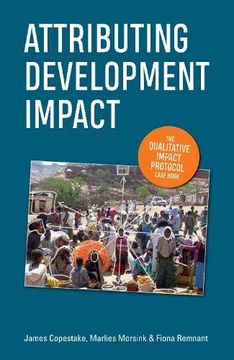Reseña del libro "Attributing Development Impact pb (en Inglés)"
Substantiating cause and effect is one of the great conundrums for those aiming to have a social impact, be they an NGO, social impact investment fund, or multinational corporation. All face the same quandary: how do you know whether, or how, you contributed to an observed social change? A wide range of impact evaluation methodologies exist to address this need, ranging from informal feedback loops to highly elaborate surveys. But generating useful and credible information in a timely and cost-effective way remains an elusive goal, particularly for organizations working in complex, rapidly evolving and diverse contexts. Attributing Development Impact brings together responses to this challenge using an innovative impact evaluation approach called the Qualitative Impact Protocol (QuIP). This is a transparent, flexible and relatively simple set of guidelines for collecting, analysing and sharing feedback from intended beneficiaries about significant drivers of change in their lives. Innovative features include the use of 'blindfolded' interviewing to mitigate pro-project bias, and the application of a flexible coding system to make analysis and reporting faster and more transparent. The QuIP has now been used in seven countries (Ethiopia, India, Malawi, Mexico, Tanzania, Uganda and UK) with activities to promote food security, rural livelihoods, factory working conditions, medical training, community empowerment and microcredit for house improvement. This book includes comprehensive 'how to' QuIP guidelines and practical insights based on case studies from these countries into how to address the numerous methodological challenges thrown up by impact evaluation. Essential reading for evaluation specialists within NGOs, governments and donor agencies; social impact investors; community development practitioners; and researchers and students interested in evaluation methodologies.

